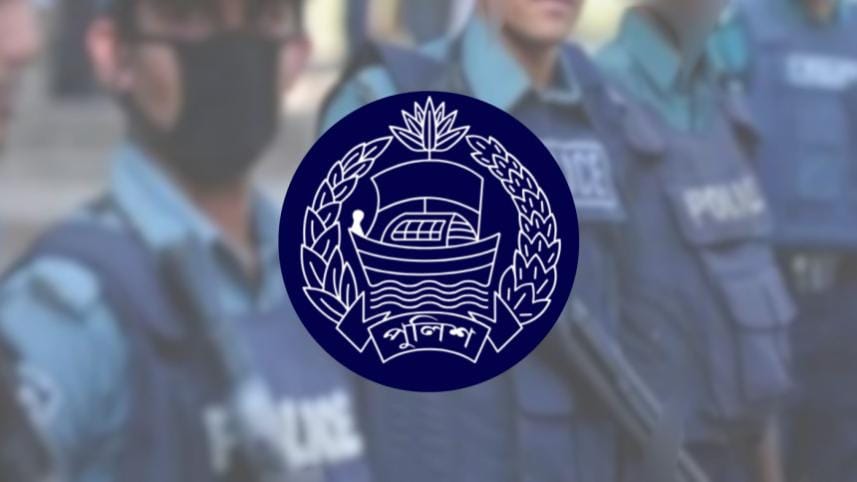Home opposes idea of police commission

Ignoring calls for holding police accountable through a separate commission, the home ministry refuses to let go of its control over the law enforcers.
Formation of an independent body, as the Police Reform Commission recommends, is unnecessary because the ministry is already doing what an independent body would be doing, says the ministry.
The demands for legislative changes to make the police accountable are being raised as around 1,400 people were killed -- most of them shot dead by cops -- during the mass uprising.
But the ministry insists that the current laws, which are from the colonial era, are good enough, and there is no need for amendments.
"If the [existing] law and regulations are abided by, the police force will be accountable," reads the home ministry response to the reform commission's proposal to "overhaul" the Code of Criminal Procedure, 1898, the Police Regulations of Bengal, 1943, the Police Act of 1861, and several other other laws and regulations.
The ministry conceded that some amendments may be made in light of emerging crimes like cybercrime and for conducting investigations in the digital sphere.
"The image of the police has been tainted because certain policemen did not adhere to laws amid extra-legal political pressure," reads the response.
Currently, the home ministry's Public Security Division controls and supervises the police force. It is also responsible for overall management, policymaking, complaint resolution, and ensuring the security of the force.
According to estimates of the recently published fact-finding report by the Office of the High Commissioner for Human Rights, the police, along with other forces and armed Awami League members, shot dead approximately 1,400 people, while thousands more suffered severe, often life-altering injuries during the July uprising.
The health ministry has recorded over 12,272 injuries.
After the Sheikh Hasina regime fell on August 5 last year, the police force completely lost its moral authority to enforce the law because the image of police acting like a tool of violent oppression was fresh in the public mind.
Even the home adviser mentioned several times that the police completely lost their morale.
A UN fact-finding report also recommended replacing the police oversight unit with a commission that would be independent of the home ministry and the police chain of command.
Members of the proposed police commission would be civil society representatives. The commission will have specialised staff, capacity, and legal authority to act as a public complaints body, says the UN report.
The report also recommended replacing the Police Act of 1861 and the Police Regulations of Bengal with laws compliant with human rights.
The police headquarters had also proposed forming an independent commission like that of Sri Lanka. This model envisions a commission comprising 11 members -- a retired Appellate Division judge or a retired IGP as the chair, four MPs from ruling and opposition parties, and four independent personalities, including a woman and a rights activist.
The serving IGP would be the member secretary, while the home secretary would be an ex-officio member.
The commission would have sweeping powers to ensure the accountability and neutrality of law enforcers, make transfers, promotions, and appointments within the force transparent, and ensure that both the force and its members remain accountable. It would also oversee the management of complaints against the police.
The Police HQ cited the example of the mass uprising in Sri Lanka and the ouster of president Gotabaya Rajapaksa, during which the police did not use lethal force on protesters and, in turn, did not face public wrath or lose their morale.
"That is because Sri Lanka's police are controlled by an independent commission," said a top officer involved in drafting the PHQ proposal.
The Police Reform Commission sent its proposals to the ministry on December 5.
Senior officials of the home ministry held a meeting on December 29, chaired by home secretary Nasimul Ghani, to review the report. The ministry then sent its opinion in writing to the Police Reform Commission, which then attached it to the full report and submitted it to the government. The report was published online by the cabinet division in January.
Ghani neither responded to calls made by this correspondent nor replied to a text message.
Officials familiar with the matter said the home ministry objected to the independent police commission because it proposes an "arrangement akin to placing the secretary under the police chief, despite the fact that the senior secretary or secretary of the ministry is the [current] controlling authority of the force".
The reform commission said whether the proposed commission should be a statutory body under an act or a constitutionally structured institution should be decided based on expert opinion. Additionally, the composition of the police commission, its scope of work, constitutional or legal obligations, and other relevant aspects require further analysis and examination, it added.




 For all latest news, follow The Daily Star's Google News channel.
For all latest news, follow The Daily Star's Google News channel.
Comments